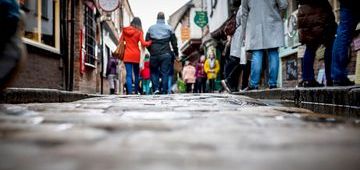
Liz Riley, Research and Evaluation Manager, Betknowmore UK, announces a research project on women and support services for gambling-related harms.
In January 2021 Betknowmore UK launched a new research project called Treatment and Support Services for Women Experiencing Gambling Harms: What Women Get and What Women Want. The project is exploring how approachable, accessible and effective women find the support and treatment services currently available to them. We aim to identify the elements that support and treatment services need to put in place in order to attract and help more women, and we’ll be involving women with lived experience in designing an “ideal” service tailored specifically to women.
Over the past five years, the number of women reporting a gambling problem has risen at more than twice the rate of men, according to figures from GamCare. This rise has been attributed to the ease with which women can now gamble online using their smartphones. Research has shown that women often gamble to escape a personal relationship, caring or work pressures, boredom, loneliness, social isolation and depression. It is also believed that women’s problems with gambling develop more quickly than men’s because they tend to choose quick, high-stakes games such as online slots and bingo that they can play continuously. Almost 70% of women who gamble use apps and websites. Gambling operators spent £747 million in 2020 on marketing messages directly aimed at identifiable groups of individuals, such as women of particular age or socio-economic groups. Not all women are affected equally by harms that range from financial problems such as debt and bankruptcy, to declining mental and physical health, including suicide, relationship problems such as divorce and neglect of family, and criminal behaviour such as fraud. Female gamblers experiencing high levels of harm are much more likely to be black, Asian or from other ethnic minority groups than white women.
Based on GamCare and Gambling Commission data, only about 1% of women experiencing gambling-related harm receive help and support. Women tend not to acknowledge that their gambling is causing harm to themselves and others until it reaches crisis proportions. The dual addictions of some women and complex problems such mental health conditions and abusive relationships may mean that women don’t feel that a gambling support service will meet their varied needs, and the perception still remains that gambling support services are for men. Other barriers to seeking help early include feelings of shame, guilt and stigma, and difficulties in finding local support services that are easily accessible and sufficiently flexible. Research shows that women want to be able to self-refer to services that are confidential and they want the option of speaking to another woman. They also find women-only peer support groups to be effective.
Between 2019 and 2020, just 25% of clients in the National Gambling Treatment Service were women, and most of those were “affected others”. In 2019, across GamCare, GambleAware and Gambling Therapy, 30% of helpline calls came from women, with 59% seeking help for another and 41% seeking help for themselves, in total numbering 9,000 women. Also there was an increase of more than 100,000 women visiting the Gambling Therapy website, taking the total number of hits from women to more than one million, up 76% from the previous year. But despite these increases, GamCare and Gambling Commission data suggest that only around 1% of women who experience gambling-related harm contact the National Gambling Helpline.
Just two providers, Gamblers Anonymous and Gordon Moody Association, offer services specifically for women. Gamblers Anonymous provides “women-preferred” groups, while Gordon Moody Association has an intensive treatment programme to meet the needs of women. This service consists of two residential retreats and 12 weekly therapy sessions. While the service is free and women can self-refer, places are limited and many women are unable to travel and stay away from their home environments. Outside of these two organisations, British support and treatment services offer little to women that is specifically designed with their needs in mind. GamCare is currently into the third year of its Women’s Programme, which is training professionals and networking to raise awareness, developing practical tools to identify girls and women in need of support and also conducting an online survey of women.
Gender neutrality is a defining characteristic of the bulk of the treatment and support services offered to women. As part of our research project we conducted an online assessment of the service network. We found that, in addition to Gordon Moody and Gamblers Anonymous, just one other provider makes an explicit reference on its website to the ability of women to access women counsellors. In contrast every provider offers the ability to self-refer into their services and most offer a range of flexible delivery formats – mostly one-to-one and group counselling and support forums, in-person, online or via phone (conversations and text). Support by people with lived experience is offered not just by GamCare and Betknowmore UK’s Peer Aid programme, but also by NHS services, Gamblers Anonymous and one regional provider.
Given the recognition that both men and women experience high levels of shame and stigma in relation to their gambling problems, surprisingly few service provider websites mention issues of shame and stigma as barriers to help-seeking. A means to help reduce stigma would be to show images of people from a variety of backgrounds, but this is rarely adopted. Some service providers show no images of real people at all, presumably as a means to maintain neutrality and discourage no one, while others show images of both men and women, sometimes of different ethnicities, though images of men are in the majority. A woman going online to find help for her gambling problem would also currently find little information and few resources addressing her problems and needs as a woman. GamCare is one of the few providers that has produced leaflets about women and gambling problems. Some regional services have links to GamCare’s resources for women, but most provide generic information about gambling problems. Self-help resources tend to be similarly generic.
The next step in our research is to hold a series of focus groups, with the first to begin in late April. The groups are open to any woman whose own gambling has led to harm. Each of the women will take part in two groups. The first group will explore women’s expectations and hopes before they contacted a support service, how easily they found help, the choices they made, the initial contact experience, what they were offered and their experiences of the services they received. The second group will be a creative exercise in designing an ideal women’s service, including the design of promotional materials to increase the appeal to and access for women. Once the groups are done, we’ll be analysing all the data collected and we hope that the results will be ready by June. The results will be then used to feed into a new Betknowmore UK peer-led women’s support group, to be launched in the autumn.
If you have any questions about the research or know someone who would like to participate in the focus groups, please get in touch with Liz Riley at [email protected]



